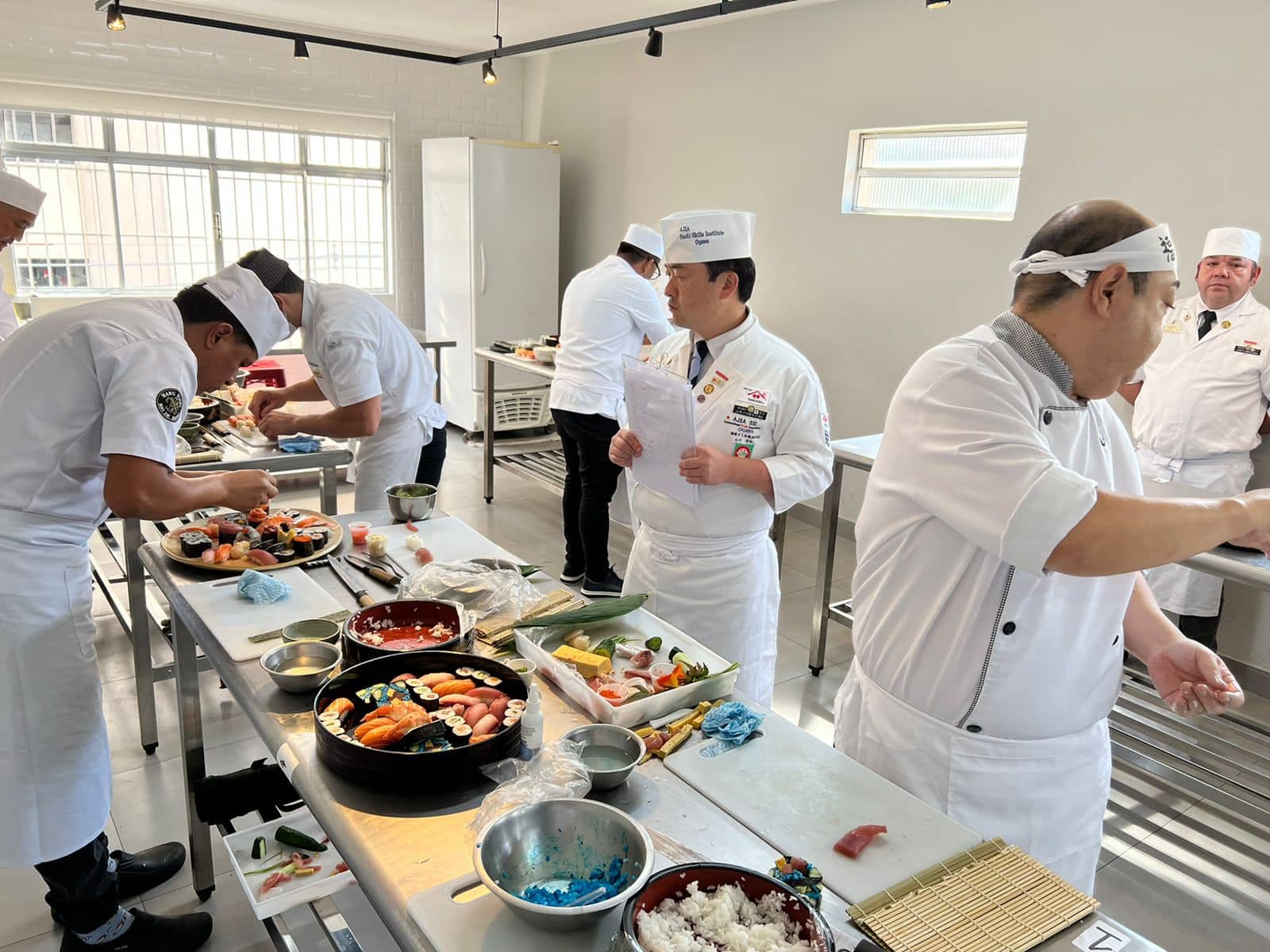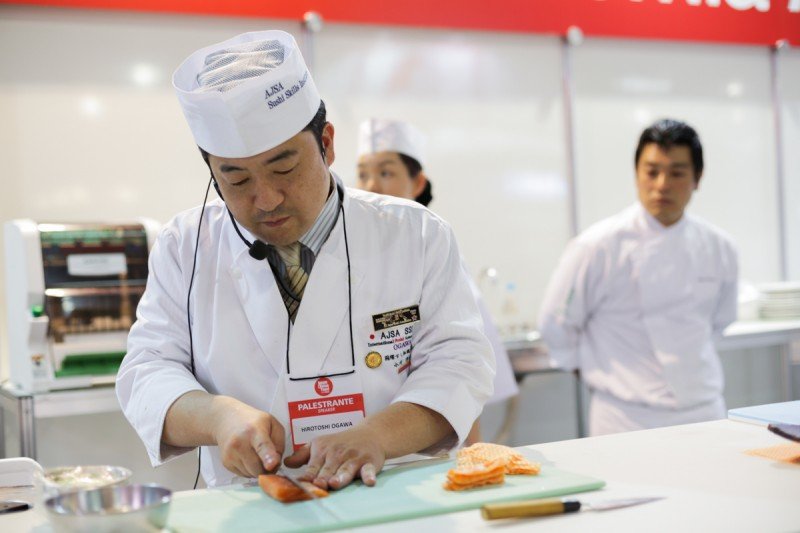
Get Sushi Accredited with the Sushi Association.
The All Japan Federation of Sushi Business and Life Hygiene Trade Associations has launched the Sushi Knowledge Overseas Certification System. Approved by the Ministry of Health, Labor and Welfare, the certification serves as a qualification for sushi cooking hygiene instructors working in sushi restaurants in Japan and overseas. This initiative is carried out by the International Sushi Knowledge Certification Association, based on the resolution of the General Assembly of the National Sushi Association.
The Sushi Knowledge Overseas Certification System has been established by the National Federation of Sushi Commerce and Life Sanitation Associations to address the issue of sushi accidents caused by raw fish, which have become more frequent due to the rapid sushi boom and expansion of the market. The system aims to recognise those who have specialised knowledge in the hygienic cooking of sushi and provide a way for people to eat raw food with peace of mind. The All Japan Federation of Sushi Commerce and Life Sanitation Trade Associations has held training courses for the "AJSA Sushi Skills Institute," an overseas certification system for sushi knowledge, both in Japan and overseas, in order to enable individuals to acquire teaching knowledge and be evaluated and certified to train successors and work overseas. The International Sushi Knowledge Certification Association has inherited these business activities and trains and certifies certifiers.

How It Works?
The lecturer will explain the course, which includes the subject and cooking skills. Those who complete the course and pass the exam will be awarded a Sushi Skills Institute Certificate (also known as the Sushi Advisor Certificate) issued by the All Japan Federation of Sushi and Life Sanitation Trade Association's Sushi Knowledge Overseas Certification System (AJSA). The eligibility criteria for taking the exam include individuals who are 18 years of age or older and who contribute to food or have a purpose of learning sushi cooking hygiene. Those involved in the Japanese food business in Japan and overseas, such as classrooms, food education, nursing care, nutritionists, etc., are also eligible to take the exam if qualified.
Contents of the Sushi Skills Overseas Certification System Certification Examination, which is certified by the National Federation of Sushi Business and Life Sanitation Trade Associations, is prepared on behalf of the International Sushi Knowledge Certification Association. This examination is based on the knowledge of hygienic cooking of sushi. Although there are some differences from Japan, such as the hygiene standards of other countries, the basic importance is placed on Japanese sushi cooking hygiene, which originated in Edomae sushi.
Course Dates, Location and Price
-
Sunday, 27th August and Monday, 28th August
Day one: Lecture from 9:00am to 6:00pm.
Day two: Workshop from 9:00am to 12:00pm and Exam and Certificate from 13:00pm to 15:00pm.
-
Knife and Stone at 2/2 Bishop St, St Peters, NSW.
-
Lecture, Workshop, exam and certificate (if passed) is $499.
Extra Badges are available. Adviser square is $75 and WSSI round is $45.
-
The test time is 60 minutes, and the questions are divided into three categories. Roughly 30% of the questions test common sense hygiene problems, 40% test hygiene processing techniques and knowledge related to cooking raw food learned in the workshop, and the remaining 30% test knowledge questions such as bacteria.
The test consists of 50 questions, and a passing score is achieved with 80% or more correct answers. Each question has three answer choices, and the examinee must select one.
The examination is conducted over two days. Day One: 6-7 hours of study. Day Two: Around 5 hours of technical workshop and examination.

Course Content
1. The History of Sushi
Origin of sushi and its evolution to modern sushi.
Production methods of sushi.
Shari-kiri method and precautions.
Preservation temperature and umami preservation method.
2. Cook Sushi Rice
Rice types used for sushi and their characteristics.
How to sharpen rice according to the characteristics of rice.
Precautions and methods for cooking with electricity, gas, and firewood.
3. Knife Knowledge
Types of Japanese knives used for cooking and their characteristics.
How to hold and use a knife during the cooking process.
Roles and characteristics of various grindstones.
How to use and sharpen whetstones to choose.
4. Cooking Fresh Fish
How to see the freshness of fish and where to look for good or bad freshness.
How to store fish and maintain its freshness.
Handling and processing methods for various types of fish such as tuna, salmon, mackerel, kohada, sea bream, shrimp, conger eel, boiled clams, and dried gourd.
5. Food Preparation and Handling
Techniques and characteristics of soy sauce pickling for Zuke tuna and other ingredients.
Handling methods for various types of fish.
Cooking method and precautions for making various kinds of shrimp into sushi shrimp.
6. Preserving Freshness of Cooked Fish
Sanitary preservation and freshness maintenance methods for different types of fish.
7. Cutting Fish (Cutting the Neta)
Cutting methods for various types of fish such as tuna, white fish, mackerel, horse mackerel, and amberjack.
8. Making Sushi
Attitude of sushi preparation.
Peripheral preparations and procedures for sushi preparation.
Procedures, precautions, and shape of making Edomae sushi, Nigiri sushi, hosomaki, futomaki, and back roll.
9. Assorted Sushi
Processing methods for sea bream and how to fill sushi according to the container.
How to place partition bamboo and its type.
10. Making Sashimi
Types of sashimi and their characteristics.
Cutting techniques for hikizukuri, hirazukuri, sogi-zukuri, and usutsukuri.
How to serve assorted sashimi and types of filling.
How to make a tatami from radish and other tatami.
11. Sanitation
Characteristics of food poisoning bacteria and their treatment and cooking methods.
Characteristics of parasites that parasitize foods and their treatment methods.
Hygiene management and precautions for cooking utensils and equipment in facilities.
Hygiene concepts and methods for those engaged in cooking.
Production methods and roles of seasonings, as well as effective sanitary treatments caused by seasonings.
Chef Hirotoshi Ogawa - Primary Judge For The Renowned World Sushi Cup In Japan
Chef Hirotoshi Ogawa will be joining us in Sydney as our guest lecturer. He will be conducting the one-day lecture followed by a sushi workshop on the next day. During his visit, Chef Ogawa will showcase the intricacies of traditional sushi skills. Ogawa San holds the esteemed position of being the primary judge for the renowned World Sushi Cup in Japan.
Furthermore, Chef Ogawa will personally select talented chefs from our event to participate in a sushi competition representing Australia in Tokyo. This unique opportunity allows aspiring chefs to showcase their skills on an international stage under Ogawa San's guidance.
By having Chef Ogawa's expertise and mentorship, we can look forward to gaining invaluable knowledge about the art of sushi and potentially witnessing our own chefs excel in the global sushi arena.
Chef Ogawa will be joining us in Sydney as our lecturer and will give a one day lecture and another day of sushi workshop. He will be here to show us every detail about traditional sushi skills and share some of the most important recipes. Ogawa San is also the main judge of the world sushi cup in Japan. He will pick up some of the possible chefs to attend a sushi competition representing Australia in Tokyo.
Masayoshi Kazato - President Of The Sushi Association
Masayoshi Kazato is the esteemed President of The Sushi Association. With years of experience and expertise, he has played a pivotal role in promoting and preserving the rich traditions of sushi. Under his leadership, The Sushi Association has flourished, fostering collaboration and innovation within the sushi industry while upholding the highest standards of quality and craftsmanship.



